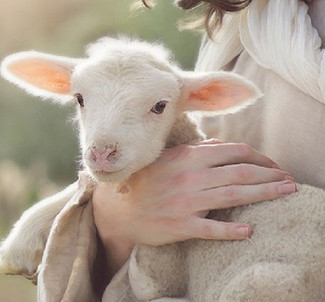When Jesus talks about the "Good Shepherd" his intent is to focus more on the role of shepherd and less on the attitude of the sheep. God's people no longer see themselves as sheep. Nowadays, our people are generally much better educated and better equipped to make their own conscience decisions. They are no longer content to be passive and are often not submissive. Instead they have come to a new understanding of their dignity and their role as baptized Christians. They realize that they share the call to ministry, to evangelization, and to service. They understand that they too are called to be "shepherds."
 Jesus is modeling a life-style to which He invites all of his followers to share - one of concern and compassion, of service and dedication, one of relentless and abounding love. This can seem to be at odds with how the Church has traditionally viewed the image of the "Good Shepherd." So it is important for us to rediscover and reinterpret the message of the Good Shepherd in a clear and decisive language that speaks to the world about how we see ourselves as His disciples.
Jesus is modeling a life-style to which He invites all of his followers to share - one of concern and compassion, of service and dedication, one of relentless and abounding love. This can seem to be at odds with how the Church has traditionally viewed the image of the "Good Shepherd." So it is important for us to rediscover and reinterpret the message of the Good Shepherd in a clear and decisive language that speaks to the world about how we see ourselves as His disciples.But how do we see ourselves? And how do others see us?
People need shepherds beside them in their suffering. They extend mercy and encouragement. They exhort and comfort. I’ve found that while the kind of clichéd reverence that once typified Catholics’ regard for their priests has waned, people still sense intuitively who the good priests are and accord them not just respect but love.
Shepherds need to lead and to guide. The people of God need to be invited, not threatened. They need ministers who are in touch with the real circumstances of life - not aloof, ivory towered idealists. Shepherds need to be models of faith and hope who can inspire trust and courage in the people of God.
Truly "good" shepherds need to be, above all, fellow travelers on the faith journey who can not only offer healing, comfort and support in the name and spirit of Jesus, but also recognize their own failures and weaknesses and humbly seek forgiveness and reconciliation.
"I am the good shepherd, and I know mine and mine know me. I give them eternal life and they shall never perish."
So what does this say to us? In short, we are all shepherds and we all need one another. If we really believe Jesus' words, if we really belong to Jesus, if it shows in our words and actions and choices then we are guaranteed what Jesus has promised: life that never ends, life without tears, hunger or thirst.
But it also continues to be painfully obvious that we all have a long way to go. The Gospel is blunt and absolutely clear in reminding us that our lives should be marked by compassion and justice, gentleness and reconciliation - by our own willingness to lay down our lives. Maybe it is time for all of us to re-examine just how willing we are to do just that.
Jesus says: "My sheep hear my voice; I know them and they follow me. I give them eternal life, and they shall never perish." Together we must always find ways to assure that all of God's people will never be without good shepherds.




